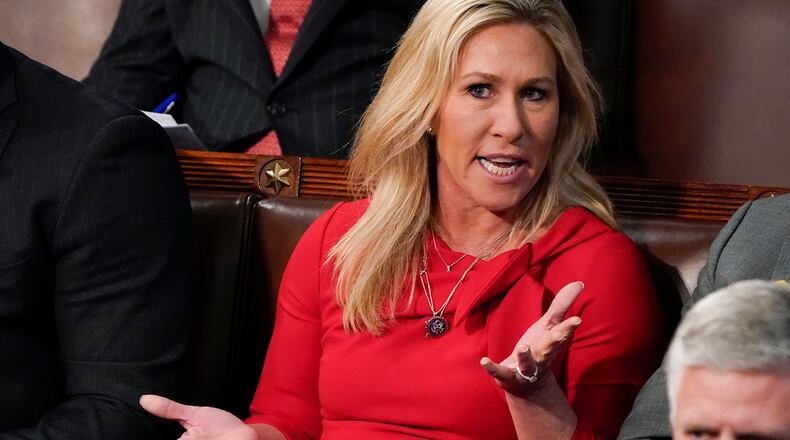Mike Rasbury was at home last month in North Georgia when he got a phone call with a question — would he want to join a challenge to keep his congresswoman, U.S. Rep. Marjorie Taylor Greene, from running for reelection in 2022?
The call came from a fellow Walker County Democrat, who had been forwarded an email from Our Revolution, a liberal political action organization in Washington that U.S. Sen. Bernie Sanders founded following his 2016 run for president.
The group was partnering with Free Speech for People, a Massachusetts-based legal nonprofit that includes “defending the Constitution and reclaiming our democracy” in its mission statement.
Together, the two groups are challenging the eligibility of Republicans in several states, including Greene in Georgia and U.S. Rep. Madison Cawthorn in North Carolina, based on Section 3 of the 14th Amendment, a rarely used Reconstruction-era clause originally meant to keep Confederate sympathizers in Congress from serving again in high office.
Rasbury, a 74-year U.S. Army veteran, had been a helicopter pilot in Vietnam. He said he took an oath to protect and defend the United States against “all enemies foreign and domestic” when he joined the service.
“It never entered my mind when I took the oath about ‘all enemies, foreign and domestic,’ that I would be looking at domestic. Well, we’re looking at it,” he said.
Now a retired court advocate, Rasbury has lived in Georgia since 1972. He’s not a member of Our Revolution and never voted for Sanders. But he said during an interview this week that he was intrigued by the call about Greene.
He said watching Donald Trump supporters attack the U.S. Capitol on Jan. 6, 2021, was like watching the planes fly into the World Trade Center on Sept. 11.
“I was shocked. Anybody that believes in democracy should be,” he said. “This was an attempted overthrow.”
After researching the two groups behind the effort to keep Greene and others off the 2022 ballot, along with the legalities of the 14th Amendment, he decided to join in. Four of Greene’s other constituents in Georgia’s 14th Congressional District decided to do the same.
“I’ve watched her for the past couple of years,” he said, “We can’t have somebody that wants to overthrow our government stay in our government and to continue on (being) involved. That’s my interpretation of Section 3.”
Specifically, the clause says that no elected official who previously took an oath to defend the U.S. Constitution can run for office again if they “engaged in insurrection or rebellion against the same, or given aid or comfort to the enemies thereof. "
There’s been no evidence presented that Greene was involved in the planning or execution of the Jan. 6 attack. And she condemned the events that day.
But she has also since led a campaign on behalf of Jan. 6 defendants at the Washington jail, calling them “political prisoners” in the “patriot wing” of the prison.
She has repeatedly described the 2020 election as “stolen” and “rigged.” At conservative rallies and events since then, she calls Trump “my president,’ all statements she says are protected under the Constitution’s First Amendment.
Rasbury said he doesn’t know what Greene’s role in Jan. 6 was. “That’s for a judge to decide,” he said.
He and the Georgia plaintiffs filed their challenge to Greene’s eligibility with the Georgia secretary of state’s office at the end of March. The case was then sent to the state administrative law court that resolves challenges to state regulations and regulatory decisions.
What would typically be a low-profile administrative case instead exploded into national headlines this week when U.S. District Judge Amy Totenberg ruled against lawyers for Greene, who had filed a separate motion in federal court to keep the case against Greene from moving forward.
Although Greene argued that the legal proceedings would put an undue burden on her as a member of Congress, Totenberg disagreed.
“This case involves a whirlpool of colliding constitutional interests of public import,” she wrote. “The novelty of the factual and historical posture of this case … has made resolution of the complex legal issues at stake here particularly demanding.”
A federal judge in North Carolina ruled the opposite way in March and kept the state challenge to Cawthorn’s eligibility from proceeding. Totenberg was appointed to the bench by Barack Obama, while U.S. District Judge Richard E. Myers II was appointed in North Carolina by Trump.
It’s not clear how or when the Georgia case will be resolved. Because of Totenberg’s decision, Greene was ordered to be in court to testify in person Friday, a development that was the goal of the effort all along.
It’s the first time any member of Congress has been compelled to testify under oath about the events of Jan. 6, a spokesman of Our Revolution explained.
I asked Rasbury what it’s like to have a member of Congress such as Greene represent him in Congress when their politics are so different.
“I don’t see her representing us, but that’s not the issue,” he said. “The issue is, if you were a part of the insurrection, and what’s in the public eye is overwhelming. I don’t think she can stay.”
Rasbury planned to be in the courtroom Friday, too. He said his involvement in the case has been “rewarding.”
“I’ve been watching and it’s time to stand up,” he said. “Nobody wants to. These people have the guts to say, ‘Let’s see what Section 3 of the 14th Amendment does.’ They put it in for a reason and it didn’t go away.”
About the Author
Keep Reading
The Latest
Featured




